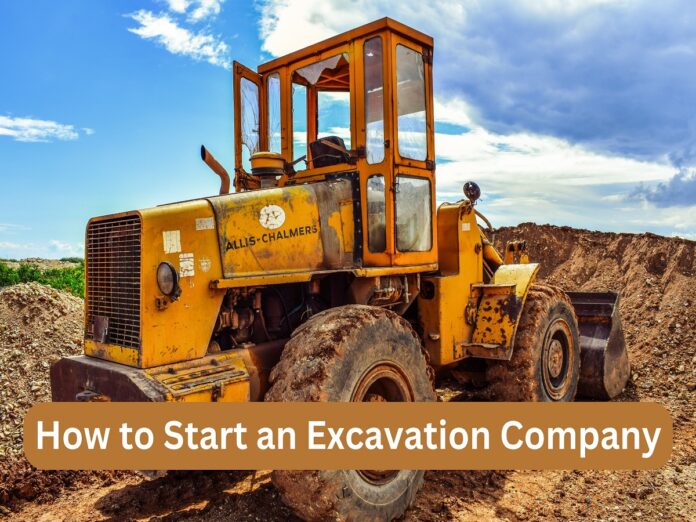Excavation companies play an important part in the construction industry by providing key services needed to prepare a site for construction. Excavation is frequently one of the first stages that must be completed in a residential, commercial, or industrial project. For individuals with the proper abilities and means, starting an excavating company can be a successful and gratifying business opportunity. To succeed, however, you must have a thorough understanding of the excavation sector, legal requirements, equipment requirements, and marketing techniques.
In this blog post, we will go through how to create an excavating company that focuses on the American market. Everything from research and planning to legal requirements, equipment requirements, employing and training staff, and marketing strategies will be covered. Hence, whether you’re an entrepreneur trying to launch a new venture or a contractor looking to extend your services, this piece will provide useful information to help you thrive in the excavation market.
Start an Excavation Company – Step by Step Guide
Step 1: Overview of the Market
It is critical to assess the need for excavation services in the US market before starting an excavation firm. In recent years, the construction business in the United States has been gradually developing, with increased demand for infrastructure development, commercial structures, and residential construction.
As a result, there is a greater demand for excavation services. Excavation services are needed for a wide range of projects, including building foundations, site preparation, grading, trenching, and utility installation. Furthermore, excavation services are frequently required for road construction, bridge construction, and other infrastructure projects.
Yet, the need for excavation services varies by area and project kind. Excavation services, for example, may be in more demand in urban areas with more development activity. Furthermore, excavation companies may specialize in certain sorts of projects, such as residential or commercial development, which might influence demand.
Excavation industry key competitors
Understanding your excavation industry competitors is a critical step in establishing a successful business plan. These are a few important competitors in the excavation sector to consider:
- Major National Businesses – Caterpillar, Volvo, and John Deere have a significant presence in the excavation industry, supplying a wide range of construction equipment and gear.
- Regional and Local Excavation Companies – Many regional and local excavation firms provide excavation services to their customers in their respective locations. These businesses may have a solid reputation and a large consumer base.
- General Contractors – As part of their total construction services, several general contractors provide excavation services. They may have established client ties and may be able to provide a one-stop shop solution for building projects.
- Excavation Companies That Specialize – Certain excavation businesses specialize in specific sorts of excavation services, such as land clearing, environmental cleanup, or trenching. These businesses may be experts in their field and provide clients with specialized services.
- New Entrants – Entrepreneurs or contractors wishing to start their own excavation company are examples of new entrants to the excavation sector. These businesses may not have a well-established reputation or customer base, but they may provide reasonable prices or one-of-a-kind services.
Step 2: Prepare a Business Plan
A business plan is essential for any entrepreneur or business owner, and it is extremely important when launching an excavating company. Here are some of the reasons why a business plan is essential for this type of firm:
- Offers a road map: A business plan includes your company’s goals, objectives, strategies, and techniques. It acts as a road map to help you navigate the startup process and keep focused on your objectives.
- Aids in the acquisition of financing: A well-written business plan can assist you in obtaining funds from investors, lenders, or other sources. It implies that you have properly researched the market and have a good business plan in place.
- Assists in decision-making: A business plan can assist you in making educated decisions about your firm, such as what equipment to purchase, what services to provide, and what pricing tactics to employ. It can also assist you in identifying potential dangers and obstacles, as well as developing contingency measures.
- Attracts clients: By detailing your unique value proposition and marketing techniques, a business plan can help you attract customers. It can also help you create credibility and exhibit your excavation business experience.
- Serves as a success benchmark: A company plan serves as a success standard by defining your financial estimates and goals. It allows you to track your progress and make changes as needed to meet your goals.
Startup Stunners has been providing high-quality business plan writing services for years, and we’re ready to assist you in developing a complete, effective strategy that will move your company ahead. Our team of professionals is committed to assisting you in achieving your company objectives and obtaining finance from banks, grants, or other sources. We’re here to help you succeed whether you’re a newbie, entrepreneur, or small company owner. Don’t put it off any longer; visit startupstunners.com/contact-us/ today and let us lead you to success!
Step 3: Laws governing excavating companies and licenses
In the United States, each state may have its own set of laws and regulations governing excavation enterprises and permits. It is critical to research and follow these rules to guarantee that your company is functioning lawfully and to prevent potential penalties or legal difficulties. Following are a few examples of state laws and regulations:
- California: Excavation contractors in California must be licensed as C-12 Earthwork and Paving Contractors. They must also follow Cal/OSHA requirements for excavation and trenching safety.
- New York: Excavation contractors in New York must have both a Home Improvement Contractor License and a Commercial Driver’s License (CDL) if they drive commercial vehicles. Excavation activity is likewise governed by New York State Industrial Code Rule 23, which establishes safety standards for trenching and excavation.
- Texas: In Texas, excavation contractors must register with the Texas Secretary of State and acquire a Texas Sales and Use Tax Permit. Furthermore, they must follow Texas Administrative Code Chapter 13, which establishes safety standards for excavation and trenching.
- Florida: In Florida, excavation companies must have a Certified Underground Utility and Excavation Contractor license. They must also follow Florida Statutes Chapter 556, which establishes excavation and trenching safety regulations.
- Illinois: Excavation contractors in Illinois are required by the Illinois Department of Agriculture to get an Excavation Contractor License. They must also follow Section 370 of the Illinois Administrative Code, which establishes safety standards for excavation and trenching.
In addition to state-specific licenses and permits, various universal licenses and permits may be necessary to run an excavation firm. Here are a couple such examples:
- Business License: To operate within their jurisdiction, most towns and counties need enterprises to get a business license or permission. This license usually entails registering your company and paying a fee.
- Contractor’s License: A contractor’s license is required in several states for excavation contractors. This license certifies that you have the knowledge and skills necessary to do excavation work safely and effectively.
- Environmental Permits: Depending on the extent of your excavation work, you may be required to seek environmental permissions from local or state organizations. These permits ensure that your excavation work has no negative impact on the environment or natural resources.
- Building Permits: If your excavation work involves building or construction, you may be required to seek building licenses from municipal or state organizations. These permits ensure that your building work is in accordance with building codes and safety standards.
It is critical to research the precise licenses and permits required by your state and local authority for your excavation firm. Failure to get required licenses and permissions might result in fines and legal complications that can harm your firm.
Step 4: Equipment
The equipment needed by an excavation business is determined by the type of excavation work you intend to do. Below are some examples of common types of excavation equipment and their average purchase price:

- Excavators: Excavators are the most prevalent sort of excavation equipment. They range in size from tiny excavators, which cost between $30,000 and $50,000, to huge excavators, which can cost more than $500,000.
- Bulldozers: Bulldozers are used for grading and levelling. The price of a bulldozer varies according on its size and features, but it can vary from $50,000 to more than $1 million.
- Backhoes: These versatile equipment can be used for excavation, digging, and grading. A backhoe costs between $30,000 and $100,000.
- Skid Steer Loaders: Skid steer loaders are small equipment used for digging and material loading. A skid steer loader costs between $20,000 and $50,000.
- Dump Trucks: These vehicles deliver soil, rocks, and other items. The price of a dump truck varies based on its size and features, however it can vary between $30,000 and $200,000.
- Compactors: These machines are used to compact dirt and other materials. A compactor costs between $5,000 and $20,000.
- Trenchers are machines used to excavate tiny tunnels for pipes and wires. A trencher costs between $10,000 and $100,000.
Equipment prices can vary greatly depending on criteria such as brand, age, and condition. It’s also critical to include in the continuing maintenance costs for each piece of equipment. Renting equipment rather than owning it completely may be more cost-effective for certain undertakings.
Step 5: Obtaining Insurance
Operating an excavation firm has some risk, therefore it is critical to have enough insurance coverage in place to safeguard your company. Consider the following forms of insurance coverage:
- General Liability Insurance: This insurance covers bodily harm and property damage that may occur during excavation activity. In the event of a lawsuit, it can also pay legal bills and settlements.
- Workers’ Compensation Insurance: Workers’ compensation insurance covers employees who are injured on the job for medical expenses and missed earnings. This form of insurance is usually mandated by law.
- Commercial Vehicle Insurance: If your excavating company owns and operates commercial vehicles, you will want commercial vehicle insurance. This insurance covers property damage, bodily injury, and other sorts of loss caused by an accident involving your corporate car.
- Professional Liability Insurance: Professional liability insurance, often known as errors and omissions insurance, protects your clients from financial loss due to professional mistakes or negligence.
- Property Insurance: Property insurance protects against the loss or damage of equipment, tools, and other business property. This form of insurance may also cover income loss due to property damage or other covered situations.
Step 6: Recruiting and Training Workers
Developing a comprehensive training program for new staff is critical to ensuring they understand the safety standards and are appropriately taught to operate the equipment. Following must be considered while creating a training program for your excavation company:
- Begin with Safety: With your excavation business, safety should be your primary priority. All personnel should get a safety orientation, which should include a review of safety protocols, such as the correct use of personal protective equipment, equipment safety features, and best practices for avoiding accidents.
- Equipment Training: Each employee should be thoroughly trained on how to use the equipment that they will be using. This involves correct operation, maintenance, and pre-use safety checks. Workers should also be instructed on how to react in the event of equipment breakdown or other emergencies.
- On-the-Job Training: After initial training, employees should be given the opportunity to practice their abilities on the job. A knowledgeable supervisor or trainer should work closely with them until they are confident in their capacity to complete duties safely and successfully.
- Ongoing Training: In addition to initial training, personnel must receive continual training to stay up with changes in equipment, technology, and safety regulations. Frequent safety briefings and equipment evaluations can assist in ensuring that all personnel are informed of any modifications or updates and can maintain a high level of safety and proficiency.
- Documentation: It is critical to preserve detailed records of all training, including safety protocols and equipment usage. This paperwork can help demonstrate your dedication to safety and be valuable in the event of an accident or injury.
Step 7: Marketing & Promotion
Creating a marketing plan is a vital component of launching an excavating business. Consider the following steps:
- Determine your target audience: Identify the exact categories of customers who will be interested in your excavation services. Homeowners, commercial property owners, developers, and contractors may be included.
- Messaging: Create a clear and simple message that communicates to your target audience the benefits of your services. Concentrate on what distinguishes your business from the competitors, such as your experience, skills, and high-quality equipment.
- Advertising Channels: Think about which advertising channels will be the most effective in reaching your target demographic. Online advertising, print advertising, direct mail, and local sponsorships are all possibilities.
- Website and Social Media: Create a quality website and a social media presence to promote your business and services. Your website should include thorough information about your services, equipment, and personnel, as well as contact information and testimonials from customers.
- Networking: Develop contacts with other construction companies and organizations. To boost your exposure and reputation, attend trade exhibitions, join local construction industry associations, and participate in industry events.
- Measure and Adjust: Assess the efficacy of your marketing activities and make any changes to your approach. Utilize analytics like website traffic, leads, and customer feedback to fine-tune your strategy and focus on the most effective techniques.
Conclusion
Starting an excavating company can be a profitable business venture, but it requires careful planning, research, and preparation. You can successfully launch and grow your excavation business by following the steps outlined in this blog post, which include conducting market research, obtaining the necessary licenses and permits, acquiring the right equipment, developing a training program for employees, and implementing a solid marketing plan.
It is critical to remember that safety should always be a top priority for both your personnel and your consumers. You can establish a solid reputation in the industry and build a successful excavation business for years to come by prioritizing safety and quality service.
Frequently Asked Questions
What licenses and licenses are required to start an excavating company?
The particular licenses and permits required differ depending on the state and local government. For each excavation project, you will require a company license, a contractor’s license, and a permit. Further permits may be required for environmental and safety standards.
How much does it cost to establish an excavating business?
The cost of beginning an excavation company varies greatly depending on elements such as equipment costs, insurance, licenses and permits, and personnel compensation. Starting an excavation firm can cost anything from tens of thousands to hundreds of thousands of dollars.
Do I need prior experience in the excavation sector to establish a business?
While prior experience in the excavation sector is advantageous, it is not usually required. Yet, it is critical to have a solid understanding of the industry, safety regulations, and equipment operating. Consider doing some employment in the sector to obtain useful experience and contacts.
How can I market my excavating business?
Create a marketing strategy that includes determining your target audience, messaging, and advertising outlets. Establish a website and a social media presence for your company, and connect with other construction companies and groups.
5. How can I ensure that my excavation efforts are safe?
Safety should always come first. Create a detailed safety strategy and offer personnel with training on correct safety measures and equipment usage. Inspect and maintain equipment on a regular basis, and adhere to all applicable safety standards and recommendations.






